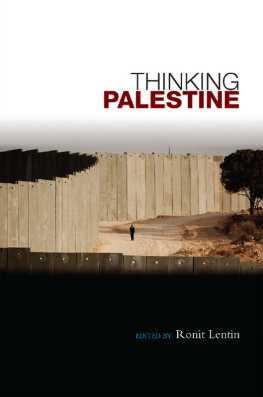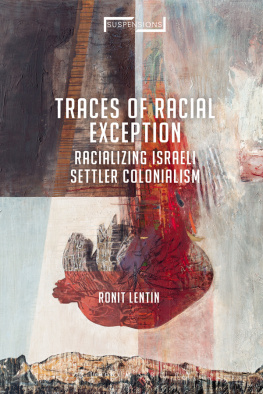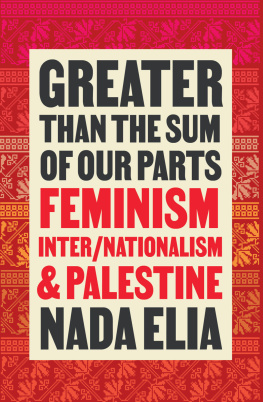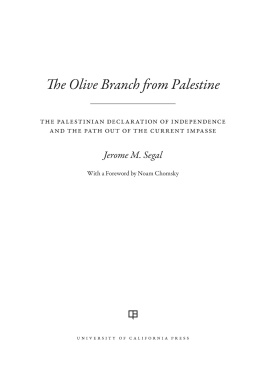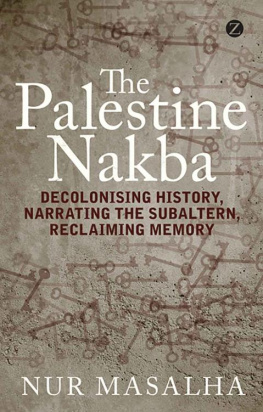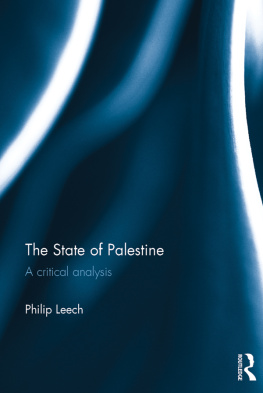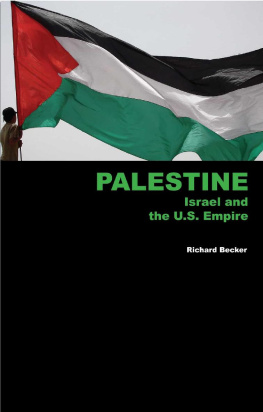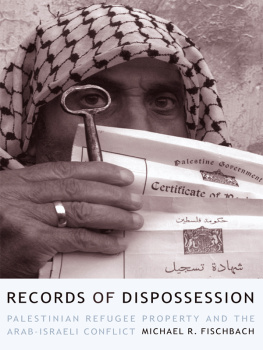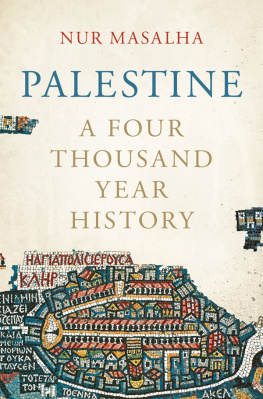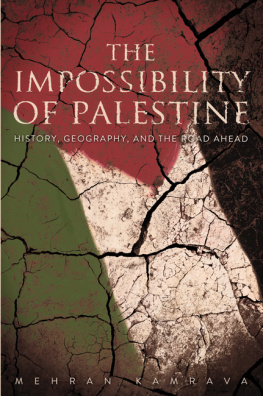
THINKING PALESTINE
edited by
Ronit Lentin

Zed Books
LONDON & NEW YORK
Thinking Palestine was first published in 2008 by Zed Books Ltd, 7 Cynthia Street, London N1 9JF, UK and Room 400, 175 Fifth Avenue, New York, NY 10010, USA
This ebook edition was first published in 2013
www.zedbooks.co.uk
Editorial copyright Ronit Lentin 2008
Copyright in this collection Zed Books 2008
The rights of Ronit Lentin to be identified as the editor of this work have been asserted by her in accordance with the Copyright, Designs and Patents Act, 1988
Designed and typeset by Long House Publishing Services
Cover designed by Andrew Corbett
All rights reserved. No part of this publication may be reproduced, stored in a retrieval system or transmitted in any form or by any means, electronic, mechanical, photocopying or otherwise, without the prior permission of Zed Books Ltd.
A catalogue record for this book is available from the British Library.
Library of Congress Cataloguing in Publication Data is available.
ISBN 978 1 78032 880 5
Contents
Ronit Lentin
David Theo Goldberg
Gargi Bhattacharyya
Honaida Ghanim
Sari Hanafi
Laleh Khalili
Alina Korn
Raef Zreik
Ilan Pappe
Nahla Abdo
David Landy
Ronit Lentin
Conor McCarthy
Anaheed Al-Hardan
Acknowledgements
This book is the collaborative effort of an interdisciplinary group of Palestinian, Israeli, American, British and Irish scholars who got together at the conference Palestine as State of Exception A Global Paradigm, held in Trinity College Dublin in September 2006. I owe them my deepest gratitude. In particular, I owe an intellectual debt to Honaida Ghanim, whose theorization of Palestine as state of exception inspired this project. I also thank Nahla Abdo, Sari Hanafi and Alina Korn, who came on board for the book. Thanks to the Institute of International Integration Studies (IIIS), Trinity College Dublin, and in particular to Adrienne Harten and Caroline Bolster of the IIIS, and to David Landy, for their assistance. Special thanks are due to the University of Dublin Fund for its financial support for this book. Thanks to Susannah Trefgarne and Ellen McKinlay of Zed Books for their editorial support. Finally, I am grateful, as always, to my soul sister Nitza Aminov.
Ronit Lentin
Introduction: Thinking Palestine
Setting the object of the debate
Not a state but rather a territory, a national entity, perhaps a state-in-becoming, Palestine occupies a central place in the contemporary political imagination. That the question of Palestine is debated above and beyond other contemporary political questions is most probably due to the central position of the Jews in the post-Holocaust West and to Palestine, the territory, being the Holy Land of the three monotheistic religions; but it is also due, as Gargi Bhattacharyya argues in this volume, to the fact that the Palestinian struggle is regarded as the unfinished business of a previous imperial era and that the struggle for a free Palestine has been popularized, pop-culturalized, and added to the style pantheon of the global left. For the late Palestinian intellectual Edward Said, however, Palestine is above all a consciousness , built on the uniqueness of Palestinian history, which has taken a different course from Arab history due to the dialectics of its traumatic national encounter with Zionism.
This dialectic connection arguably makes Palestine a unique case study. Saids book The Question of Palestine , which re-introduced the Palestinians into English-language academic and political debate, was not intended as a value-free account. It rather described our night and our slow awakening, always dialectically setting the Palestinian experience against Zionism, which has meant as much to us, albeit differently, as it has to Jews. What we need to inform the world is how it : xv).
This book does not aim to discuss the question of Palestine in its entirety, nor Israel or Jewish history. The object under consideration is rather the Palestinian conception of Palestine and the representations of Palestine, the consciousness, the political idea, the territory, the history, seen, above all, as a dialectical experience positioned against its perennial other, Zionism. The starting point for this book is an analysis of Palestine in light of Giorgio Agambens state of exception (: 88).
In view of the relationship between racial states and resistance, and because, like the other contributors to this volume, I am politically committed to Palestinian self-determination, I face a dilemma in presenting a seemingly abstract theorization of Palestine (and dialectically, Israel) in light of Agambens state of exception. My dilemma is that notwithstanding Agambens positing sovereigntys subject as homo sacer , or bare life, at the mercy of sovereign power (1998) such analysis runs the risk of erasing the active agency of the Palestinian subject, represented as either passive victim of Israeli dispossession or aggressive insurgent, but with interpretative control wrested away. As illustrated in the collection of autobiographical narratives of dispossession of Palestinian and Israeli women that I co-edited with Nahla Abdo (), I am deeply committed to the de-objectification of the Palestinian subject. I am, however, also well aware of my problematic position as (an exiled) citizen of Israel, and as such a member of the perpetrator group, in relation to representing Palestinian subjectivity.
Indeed, the question has to be asked why so many Israeli scholars are : 134), contributing to the colonial power/knowledge regime. The close cooperation between the security services and Israeli universities and research institutes is no secret.
Like many anti-Zionist Israelis, whose road to Damascus tales often date back to the wake of the 1982 Lebanon war, I too have my account (Lentin 2007). In recounting these Israeli anti-Zionist Damascene tales, the moment of conversion is crucial and how this is recounted indicates our sense of self and current political positionality. However, auto/biographical accounts are ultimately about the teller rather than the told, regardless of our conviction that our personal auto/biography is about empathy and solidarity. Thus, despite the good intentions, in much Israeli research on Palestine the Palestinians often get erased, their voice subsumed by the voice of the powerful colonizer, leading to a degree of appropriation that we are all guilty of (see my chapter in this volume).
In this light, and in light of the chapters in this volume, I want to propose a theorization of Palestinians not merely as victims, or as spoken for and about (although, of course, to theorize is always also to objectify). I am inspired by the Jewish Israeli sociologist Yehouda Shenhavs () and of Agambens interpretation of Benjamins Critique of violence (1921), and Shenhavs critique of Agamben for ignoring, unlike Schmitt or Hannah Arendt, the role of European imperialism in conceptualizing European sovereignty. Shenhavs postcolonial reading of Fanon and Benjamin may lead to the missing link in thinking about Palestine and Palestinian subjectivity, even though, surprisingly, he stops short of theorizing the State of Israel as a racial state.
I begin this introduction with a brief theoretical outline of the state of exception, state racism and the racial state. I then posit Israel as a racial state, where the state of exception with reference to its Palestinian other was instituted from its very establishment through a series of emergency laws, not yet repealed. I then read the Palestinian active agent through a discussion of Fanon, Benjamin and Shenhav. I conclude by outlining the contents of the book, including, inter alia, a contestation of the applicability of Agambens theorization of the state of exception to the State of Israel.
Next page
